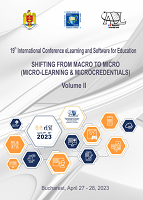THE EFFECT OF USING MICROCONTROLLERS IN TEACHING PROGRAMMING
THE EFFECT OF USING MICROCONTROLLERS IN TEACHING PROGRAMMING
Author(s): József UDVAROS, Norbert FORMANSubject(s): Education, ICT Information and Communications Technologies, Sociology of Education
Published by: Carol I National Defence University Publishing House
Keywords: Microcontrollers; TinkerCad; teaching programming; computational thinking; teaching method;
Summary/Abstract: Today, the vast majority of devices around us are based on electronics, contain a microcontroller, and are controlled by software. With sensors, they are able to obtain information from the outside world, which can be processed with the help of software. These electronic devices can be effectively used in the teaching of programming in high school and university education. With their help, we can apply new effective methods to raise the standard of education. It has a particularly strong impact on the development of technical and computational thinking, which students greatly need in our information society. The use of microcontrollers in teaching programming can have a number of positive effects on the students' level of knowledge. Microcontrollers are physical computing devices that can interact with the real world. This provides a hands-on learning experience that helps students understand how software can control hardware and vice versa. TinkerCad is an online application for programming microcontrollers, among other things. TinkerCad provides a virtual circuit simulation platform where users can build a circuit that contains a microcontroller, program it, and then simulate the circuit's behaviour. In our article, based on the results of a research, we present the impact of using microcontrollers in teaching programming. The results of our research show that students achieve better results on average when learning programming using visual tools (microcontrollers, TinkerCad). Their application can effectively develop computational thinking, algorithmic thinking, and problem solving skills.
Journal: Conference proceedings of »eLearning and Software for Education« (eLSE)
- Issue Year: 19/2023
- Issue No: 02
- Page Range: 139-151
- Page Count: 13
- Language: English

